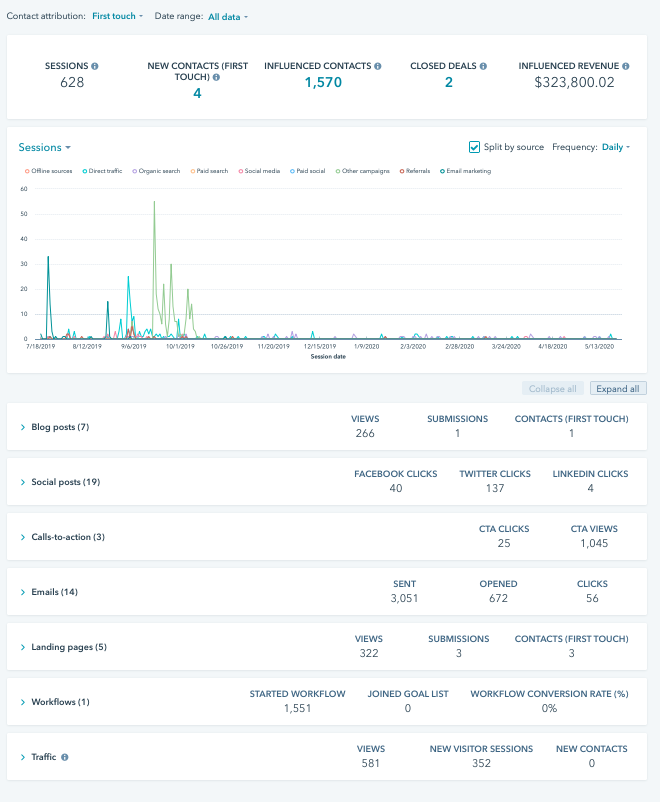Measuring Marketing ROI: The Marketer's Toolbox for Measuring Success

Before any good marketer launches a marketing campaign, they ask themselves one very important question. Will I see a return on this campaign investment?
No matter the size of the investment – if you’re putting dollars in, you’re expecting to see dollars back. Not just for the sake of a successful campaign, but the profitability of your company.
The question of how to measure that return though is a tricky one. A question with no straight-forward answer. I know, NOT what you clicked into this blog to hear. But bear with me, as I’ve provided tips and resources below to help you make sense of your marketing dollars spent.
Determining Marketing Campaign ROI Benchmarks
There is no one magic benchmark for determining overall marketing ROI. All marketing tactics are different. What’s considered “good ROI” varies based on several factors – type of strategy, channels used, industry, etc.
Determining the ROI on a paid digital ad campaign run through a platform like Facebook or Google Adwords where you can see what you put in and what you got out is different than determining ROI on a content marketing strategy. But, that’s not to say it can’t be done.
To accurately measure the return on investment (ROI) of your marketing campaign, it's essential to utilize the best formula. According to HubSpot, this formula involves multiplying the number of individuals who provide their personal information with your company's offer by the conversion rate of leads into customers and then multiplying that by the average sales price. From this, subtract the cost or ad spend of your campaign and multiply the total by 100. By following this method, you can determine the true value and effectiveness of your marketing efforts.
When calculating “cost or ad spend,” be sure to factor in the cost of creating and promoting. This is especially important with content marketing as creating content for content marketing takes time — and time is money.
In addition to the hard and true dollar amounts resulting from your campaign, we encourage you to consider the non-financial gains too. While you may not be able to tie brand awareness or loyalty, social followers, likes, and shares, or high-quality site traffic to immediate ROI, that doesn’t mean these wins won’t offer some return in the long term!
What's in the Modern Marketers ROI Toolbox?
Measuring the impact of your campaign can be next to impossible without the right tools, but as our friends at ChiefMartec.com have mapped out, there are more than 10,000 marketing tools out there as of 2022!
So it's understandable to be a little lost when thinking about the kinds of tools that help to measure marketing effectiveness and tie things back into your Marketing efforts. Here is a list of some of my favorite tools for measuring marketing success:
Utilizing UTM Codes
One of the most powerful tools in a marketer's toolbox is the use of UTM codes, also known as UTM parameters or tracking tags. While most reporting methods allow you to identify the source of your website traffic, UTM codes take it a step further by helping you attribute that traffic and conversions to specific pages and posts within the traffic source.
A UTM code is a small snippet of text that is added to the end of a URL. It acts as a tracking mechanism, allowing you to track and identify where your website traffic is coming from. By using UTM codes, you can easily determine the success of a marketing campaign and attribute it to specific pieces of content.
Let's say you're running a social media campaign and you want to track how many conversions are coming from each platform. By adding a UTM code to the URL of each social media post, you can easily see which platform is driving the most traffic and conversions. For example, you can add a UTM code like "?utm_source=facebook" to the end of a URL when sharing a post on Facebook. This will help you identify the success of that specific post and measure its impact on your overall campaign.
UTM codes are not only helpful for tracking the success of your marketing campaigns, but they also provide valuable insights into your audience's behavior. By analyzing the data collected from UTM codes, you can gain a deeper understanding of which content resonates with your target audience and which channels are most effective in driving traffic and conversions.
In order to create UTM codes, you can use various tools such as HubSpot or Google Analytics to create your UTM tracking codes. These platforms allow you to generate unique UTM codes for each piece of content or campaign, making it easy to track and measure their individual performance.
Overall, UTM codes are an essential tool for any marketer looking to accurately measure the impact of their campaigns and attribute success to specific pieces of content. By utilizing UTM codes, you can gain valuable insights into your audience's behavior and make data-driven decisions to optimize your marketing efforts.
Associate Activity to HubSpot Campaigns
You can take tracking tags a step further by grouping all campaign-related codes under one campaign. HubSpot makes this easy for us marketers in their Marketing Hub.
Before attending a previous Inbound Marketing Conference – the Stratagon team initiated a campaign to promote our presence at the event. Every email, blog post, social post, landing page, CTA, automated workflow, etc was tracked in a way that allowed us to measure the overall success of the whole campaign.
 Hubspot Campaign View
Hubspot Campaign View
When all was said and done, we could see how many new contacts and closed deals were influenced by the campaign and the revenue attributed to the campaign.
Multi-Touch Attribution Reporting in HubSpot Enterprise
Ultimately, we as marketers want credit where credit is due. We want to be able to tie a closed deal back to our hard work (sometimes sweat … and sometimes even tears). We want to stand in front of the other departments in our company and report our successes. That’s attribution!
For some marketers, attribution might be a little intimidating. There’s always the possibility that your hard work isn’t influencing lead acquisition or closed deals the way you and your company may have thought. That’s OK! It is best not to leave it out-of-sight-out-of-mind. Attribution models provide you with a full-picture look at your performance – a baseline – and there’s only one way to go from there… up!
With HubSpot’s Marketing Enterprise, access to HubSpot custom reporting functionality, and deals tracked in HubSpot Sales Hub – you can take full advantage of the multi-touch attribution reporting HubSpot has to offer.
Each of the previously listed tools should provide you with everything you need to advocate for you and your team in the future. The insight you now have at your fingertips will equip you to have conversations with your organization regarding investing in or amping up resources (people, new tools, budgets, etc.).
Do you still need help convincing the higher-ups of your true value? Partnering with a marketing agency can help you not only strategize and implement but also tie reporting back to real sales. Reach out to us today, and let’s start uncovering your team’s full potential.


